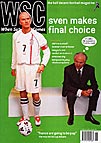 Ian Farrell reflects on the sad trajectory of Georgi Kinkladze's career, from mistrusted genius at Man City to occasional tubby cameos at Derby
Ian Farrell reflects on the sad trajectory of Georgi Kinkladze's career, from mistrusted genius at Man City to occasional tubby cameos at Derby
In these troubled times for football, it’s comforting to know that some things never change. The “Ellis Out” protests, the fixture congestion complaints and, of course, the Winter Panic Of The Bottom Six Manager. As sure as night follows day, February sees Ginolas and Djorkaeffs arriving at the sharp end amid talk of “having a little bit of something extra” and how “he can make all the difference for us”. They are then usually benched within a month amid talk of being “a luxury we can’t afford” and how “this is a battle and we need warriors” as the even-more panicky manager decides instead to try to Colin Hendry his way out of the relegation zone. Derby under John Gregory did not dip into the Cranky Maverick bargain bin, but that’s because they didn’t have to. Step forth from the shadows, Georgi Kinkladze.
Ah, Kinkladze. The name sends Manchester City fans into a nostalgic haze. A magician, all flicks and feints, easing the pain of the Alan Ball era with killer passes and breathtaking goals. Well, some of the time. He did have a tendency to drift out of games, to the degree that he became, after Matt Le Tissier and David Ginola, the favourite ideological punching bag for the Alan Hansens of this world. That mistrustful view was shared by many in the media and continues to this day: in Derby’s match against Man Utd in March – in which Kinkladze started and played well – Martin Tyler dismissively noted that he “joined City in the Premiership and left them heading for the Second Division”. True, but you won’t find many at Maine Road who would link the two. Indeed, for about 18 months he was the only thing to prevent 90 minutes of pondering what else you could have done with your £16.
Inevitably, the men who mattered shared the pundits’ misgivings. Successive occupants of the coaching puffa jacket believed in him less and less until eventually Joe Royle ignored him completely. Finally, in 1998, a huffing and puffing, creatively bankrupt City side were relegated to the Second Division and the superfluous Kinkladze was sold to Ajax.
It was a disaster. A calamity of Norman-Wisdom-joining-the-SAS proportions, and why would anyone expect anything else? If City’s managerial tag-team couldn’t shoehorn him into their modest “system”, what chance did he have with the technical complexities and tactical discipline of the Ajax machine? Why on earth did they want him anyway? As with much of Kinkladze’s career, desperation played a big part. As one by one Louis van Gaal’s all-stars were signed up by G-14 asset-strippers, so their replacements at Ajax had “appearing soon at a Nationwide League ground near you” stamped all over them (stand up Gerald Sibon, Nordin Wooter and Martin Reuser).
True, they could all discuss tactics insightfully and speak several languages, but they couldn’t produce the artistry of Kinkladze. The transfer seemed a roll of the dice rather than part of a well thought-out strategy and Kinkladze was not a good percentage gamble. He played just a dozen league games before starting the inevitable drift from pitch to bench to reserves to couch to fridge to couch. After a year of inactivity, the fish out of water had become more of a beached whale.
But a saviour was in the wings. The 1999-2000 season was entering its final stretch and jittery managers everywhere were scanning football’s equivalent of Loot. Enter Jim Smith, carrying an industrial-sized vat of Slimfast and muttering something about him “having a little bit of something extra that could make all the difference”. And it worked! For a while. But then the cycle began again. I don’t think he even stopped off at the reserves this time. As Keegan found room for both Eyal Berkovic and Ali Benarbia in one City team, Kinkladze was ignored by Colin Todd because of his workrate, or lack of it. Right place, wrong time.
But sooner or later there’s always another relegation battle to be fought. Just as in desperate situations non-believers will turn to prayer, putting their faith in something they don’t understand as a last resort, so Kinkladze could dust off his boots once more. Who knows, maybe this time it will be for good. For all his Cloughisms and contrived characteristics, John Gregory does seem to be genuinely different. Maybe he will not only keep Gio in there but build a team around him.
I wouldn’t bank on it. Something tells me that as 2002-03 kicks off, Kinkladze will be back among the pizza boxes and remote controls. Is this any way for such an outrageously talented player to spend his best years? And so, I make this plea to him: leave England. Find a more fitting stage; if that means a smaller one then so be it. Go to Turkey or Portugal or Austria. Follow Riedle to Luxembourg if you have to. Just go somewhere where some of those mazy dribbles will come off and a crowd, however small, will feel the way we did in 1996. If not, see you next February.
From WSC 184 June 2002. What was happening this month